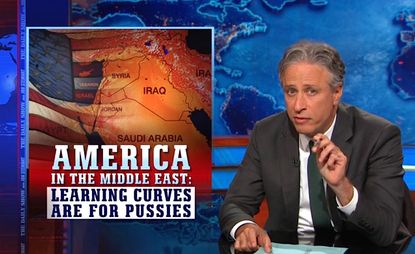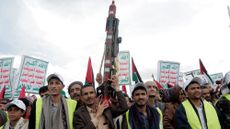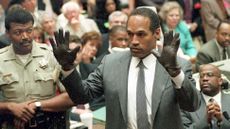Jon Stewart explains ISIS with a brief history of U.S. guns in the Middle East


On Monday's Daily Show, retired Gen. Stanley McChrystal said he didn't think the U.S. deserved blame for creating ISIS and politely dismissed Jon Stewart's theory that the battle against Islamic State is a convoluted rematch of the Iran-Iraq war in the 1980s. But this is Jon Stewart's show, so on Tuesday, he elaborated on that theory.
Stewart started out by playing clips of various Republicans accusing President Obama of creating ISIS by pulling U.S. troops out of Iraq, which, he noted, was set in motion by George W. Bush. That wasn't Stewart's only problem with the Obama-did-it charge, but he didn't stop with tracing ISIS's roots to Bush's 2003 invasion. Using the GOP's proposed solution to ISIS — arming some faction — Stewart took a look back at America's poor track record in the region. "America is like Wile E. Coyote," he said: "Every time we send a weapon into the desert, it ends up exactly where we don't want it to end up."
The short version of Stewart's history lesson is that the U.S. armed Iraq's Baathists against Iran in the '80s, fought Iraq's Baathists in the '90s and '00s, and are now essentially allied with Iran against those same Iraqis, now rebranded as ISIS. Stewart's version is more entertaining and detailed. You can watch below. Peter Weber
Subscribe to The Week
Escape your echo chamber. Get the facts behind the news, plus analysis from multiple perspectives.

Sign up for The Week's Free Newsletters
From our morning news briefing to a weekly Good News Newsletter, get the best of The Week delivered directly to your inbox.
From our morning news briefing to a weekly Good News Newsletter, get the best of The Week delivered directly to your inbox.
Create an account with the same email registered to your subscription to unlock access.
Sign up for Today's Best Articles in your inbox
A free daily email with the biggest news stories of the day – and the best features from TheWeek.com
Peter has worked as a news and culture writer and editor at The Week since the site's launch in 2008. He covers politics, world affairs, religion and cultural currents. His journalism career began as a copy editor at a financial newswire and has included editorial positions at The New York Times Magazine, Facts on File, and Oregon State University.
-
 Israel's war is America's, too
Israel's war is America's, tooOpinion 'Death to America' and 'Death to Israel' are just different slogans for the same hatred
By Mark Gimein Published
-
 Amanda Montell's 6 favorite books that will expand your knowledge
Amanda Montell's 6 favorite books that will expand your knowledgeFeature The linguist recommends works by Mary Roach, Alice Carrière, and more
By The Week US Published
-
 Crossword: April 16, 2024
Crossword: April 16, 2024The Week's daily crossword
By The Week Staff Published
-
 OJ Simpson, star athlete tried for murder, dead at 76
OJ Simpson, star athlete tried for murder, dead at 76Speed Read The former football hero and murder suspect lost his battle with cancer
By Rafi Schwartz, The Week US Published
-
 Momofuku's 'Chili Crunch' trademark uproar
Momofuku's 'Chili Crunch' trademark uproarSpeed Read The company's attempt to own the sole rights has prompted backlash
By Rafi Schwartz, The Week US Published
-
 Kevin Hart awarded Mark Twain Prize
Kevin Hart awarded Mark Twain PrizeSpeed Read He is the 25th recipient of the prestigious comedy prize
By Peter Weber, The Week US Published
-
 Is Downton Abbey set to return for a final film?
Is Downton Abbey set to return for a final film?Speed Read Imelda Staunton reveals that a third movie may be in the pipeline
By Adrienne Wyper, The Week UK Published
-
 'Oppenheimer' sweeps Oscars with 7 wins
'Oppenheimer' sweeps Oscars with 7 winsspeed read The film won best picture, best director (Christopher Nolan) and best actor (Cillian Murphy)
By Peter Weber, The Week US Published
-
 'Rust' armorer convicted of manslaughter
'Rust' armorer convicted of manslaughterspeed read The film's cinematographer Halyna Hutchins was shot and killed by actor Alec Baldwin during rehearsal
By Peter Weber, The Week US Published
-
 The Beatles are getting 4 intersecting biopics
The Beatles are getting 4 intersecting biopicsSpeed Read Director Sam Mendes is making four separate movies, each told from the perspective of one band member
By Peter Weber, The Week US Published
-
 Taylor Swift to Miley Cyrus: female artists dominate 2024 Grammys
Taylor Swift to Miley Cyrus: female artists dominate 2024 GrammysSpeed Read SZA, Phoebe Bridgers and Lainey Wilson were also among the winners at LA gala
By Arion McNicoll, The Week UK Published